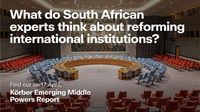A new survey, the "Emerging Middle Powers Report 2025" by Körber-Stiftung, reveals a stark divergence in foreign policy perspectives among decision-makers from Brazil, India, South Africa, and Germany. The findings highlight significant regional differences in how these countries perceive global influence, environmental responsibilities, and the prospects for international reform.
According to the survey, 60% of South African respondents and 59% of Brazilian respondents view the global influence of the United States negatively. In contrast, a substantial 75% of German respondents see it positively. This divide underscores the varying priorities and concerns that shape foreign policy discussions in these nations.
In India, 52% of respondents expressed a preference for neutrality amid the escalating rivalry between China and the United States. This sentiment reflects a cautious approach as India navigates its complex relationships with both powers.
Environmental issues also emerged as a critical concern across the board. Approximately 70% of respondents in Brazil and South Africa, along with 60% in India, believe their countries are not allocating sufficient resources to protect the environment. This acknowledgment of environmental inadequacy signals a growing awareness of climate change and its implications for international relations.
However, the survey paints a pessimistic picture regarding the potential for reform of international institutions. Around 60% of respondents from all four countries expressed doubts about the likelihood of significant reforms in institutions like the International Monetary Fund, World Bank, United Nations, and World Trade Organization in the next five years. This skepticism extends to expectations about the relationship between high-income and low- to middle-income countries, with many anticipating a deterioration in these interactions over the coming years.
In terms of foreign policy priorities, experts from Brazil identified climate change as the foremost issue, while South African and Indian experts highlighted different concerns. For India, the focus remains on China and regional security, while South African experts, particularly given the country's G20 presidency, are increasingly emphasizing relations with the Global South.
Interestingly, the survey indicates a shift towards non-alignment. Eight out of ten respondents in Brazil and South Africa prefer neutrality over aligning with either the United States or China. A notable increase in this preference is observed among Indian respondents, with 52% favoring neutrality in 2025, a rise from 38% in 2023. In Germany, the preference for neutrality/non-alignment also grew from 2% in 2023 to 19% in 2025.
The survey, conducted by Verian Germany between October 15 and December 2, 2024, involved a diverse group of participants, including government officials, parliament members, military personnel, diplomats, and private sector representatives. The Körber-Stiftung aimed to foster dialogue between Germany and these emerging middle powers through this initiative.
In a related development, South Africa's new envoy to the United States, Mcebisi Jonas, has downplayed his past criticisms of former President Donald Trump. On April 15, 2025, Jonas emphasized the importance of the U.S.-South Africa relationship for the national agenda, stating, "The US relationship with South Africa is fundamentally important for the national agenda for South Africa." This marks a strategic move by President Cyril Ramaphosa, who appointed Jonas to mend fraying ties with Washington.
Jonas's appointment comes in the wake of tensions that arose when Trump froze aid to South Africa over its genocide case against Israel and allegations of land seizure affecting White farmers. Despite these challenges, Jonas noted that there are over 600 U.S. companies operating in South Africa, indicating a foundation for a long-term relationship.
While Jonas has previously referred to Trump as a racist and a "narcissistic right-winger," he now seeks to distance himself from those remarks, asserting that he was speaking as a private individual at the time. He acknowledged the complexity of the situation and the historical strains in U.S.-South Africa relations that predate Trump's presidency.
Jonas's diplomatic efforts reflect a broader trend among emerging powers to navigate the intricacies of international relations while maintaining a focus on national interests. As the global landscape evolves, the perspectives of countries like Brazil, India, South Africa, and Germany will play a vital role in shaping future interactions on the world stage.
The findings of the "Emerging Middle Powers Report 2025" and the diplomatic maneuvers by figures like Jonas underscore the importance of understanding diverse geopolitical perspectives. As these nations grapple with their foreign policy priorities, the implications for international cooperation and reform will be significant.





